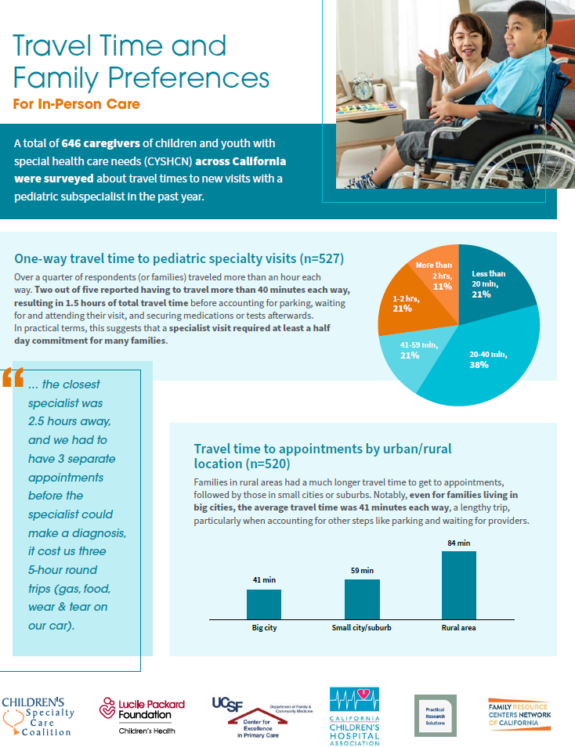CCS Medical Directors Tackle Thorny Issues
If you’re familiar with the California Children’s Services (CCS) program, you’ve probably heard the story: A child qualifies for CCS and is receiving services. The family moves to another county, and suddenly things change. Sometimes the new county interprets regulations differently and the benefits the child received in the original county are no longer available, or the child no longer qualifies for CCS at all. Care, and lives, can be disrupted. Families and care providers alike are frustrated.
These are the kinds of longstanding issues that the California Children’s Services Medical Advisory Committee (CCS-MAC) is working to address. Founded in 2012 with funding from the Lucile Packard Foundation for Children’s Health, the CCS-MAC is a statewide organization of CCS medical directors. The members develop guidelines for standardizing interpretation of CCS eligibility, and make recommendations to the Department of Health Care Services. The goal is to have clear interpretation of state policies so that they are applied more consistently throughout the state, said Mary Doyle, MD, Associate Medical Director of California Children’s Services in the Los Angeles County Department of Public Health and a member of the CCS-MAC Steering Committee.
Three goals have taken priority so far for the CCS-MAC:
- Creating a consensus document on medical eligibility for CCS services and modifying it on an ongoing basis.
While the goal is consistent medical eligibility across the state, Doyle said, eligibility cannot be completely standardized in a single document because it is based on state regulation and includes both specific diagnoses and broad categories of illness that require consideration of a child’s particular situation. Eligibility determinations also evolve as new conditions are identified, and new pharmaceuticals and technologies become available. Ongoing conversations and modifications are necessary.
“There can be individual circumstances and cases where eligibility is not clearly spelled out in regulations,” Doyle said. “The CCS-MAC’s top priority is getting everyone together to talk about consistency.”
- Pursuing standardization of how primary medical conditions are coded so that data on CCS-enrolled children are consistent and comparable from county to county. This is particularly important as the CCS program looks to measure the effectiveness of its case management for the patients and families it serves, Doyle said. “We are really trying to be a data-driven program,” she said.
- Becoming an affiliate of the Statewide Conference of Local Health Officers. CCS-MAC is one of only about a dozen organizations around the state to achieve this status. The partnership with local health officers helps raise the visibility of children in the public health arena, where the focus is frequently on adult health. The goal is for county health officers to become stronger voices for the pediatric population, and also be more aware of children with special health care needs in their regions, including understanding the services these children will require as they transition to adulthood.
All CCS medical directors in the state have participated in the CCS-MAC, Doyle said. Leadership is provided by a steering committee, and work groups take on specific tasks.
Currently, one newly formed work group is developing a two-year plan for the organization. The members are considering how the medical directors can work together to assist the Department of Health Care Services and other stakeholders with emerging issues facing the CCS program and its families, and identifying priorities for the group’s input.
“The CCS-MAC is trying to be a liaison to the state,” Doyle said. “We want to give them a sense of what families and providers are facing on the ground. We are working in every region, and we know the program inside out.”
A second work group is formulating underlying principles for an approach to medical eligibility, with a particular focus on conditions that currently are not eligible for CCS. For example, the work group is considering obstructive sleep apnea, said Diana Obrinsky, MD, MPH, Medical Director of the Alameda County CCS and a member of the CCS-MAC steering committee. The group’s recommendations will be sent out in April for all CCS-MAC members to review, and then a consensus document will be forwarded to the state.
“The work group also is examining the underlying principles of eligibility outlined in regulations and other state documents so we can develop a comprehensive sense of how we approach decision-making (about eligibility),” Obrinsky said.
She notes that in the past the state provided funding to allow the CCS medical directors from around the state to meet regularly and establish personal relationships that enhanced their working together. “We had the opportunity to review cases that would reveal differences in counties or regions,” she said.
But state funds are no longer available, and the Foundation’s grant funding has come to an end, so Alameda and Los Angeles counties have agreed to take responsibility for staffing and maintaining the group to ensure that the work continues.
“Our administrators understand how important it is for this activity to continue,” Obrinsky said. “They believe it’s a function that should not disappear for lack of funds.”
“It’s telling that the CCS-MAC has so much support that these two counties were willing to step up and take over,” Doyle said. “This means that the group can continue to pursue activities that will result in a consistent program that makes it easy for CCS children and families to get the services they need.”



